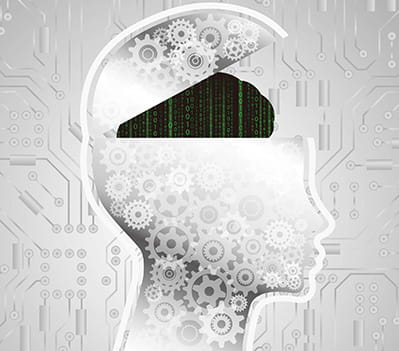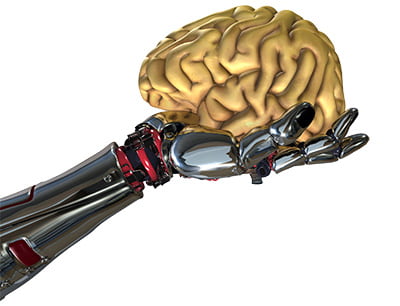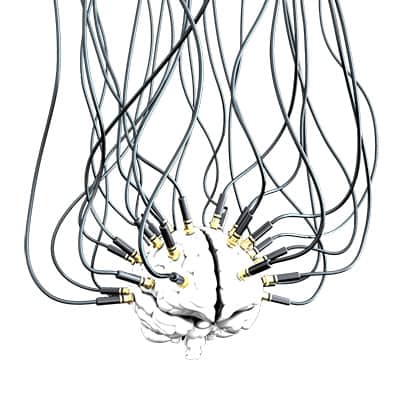Abu Dhabi’s New Policy on the use of Artificial Intelligence in the Healthcare Sector
 Scientists throughout history have delivered many inventions that have continuously made human life much easier. The most recent technology that has changed all our lives is Artificial Intelligence. Artificial Intelligence (AI) would be termed by many as the “greatest thing since sliced bread”. Despite the difference in opinions, no one can deny the effect AI has had on our daily lives. We have several examples of Artificial Intelligence in our daily lives such as Virtual Personal Assistance (like Siri, Alexa, Cortana), video games like the 2014 “Middle Earth: Shadow of Mordor”, smart cars, the automated customer support on websites, fraud warning software used by emails and banks, and even a robotic chef! The development of AI has been said to have ushered the fourth industrial revolution, on a scale as we have never seen before. In fact, the World Economic Forum commented that “AI is disrupting almost every industry in every country.”
Scientists throughout history have delivered many inventions that have continuously made human life much easier. The most recent technology that has changed all our lives is Artificial Intelligence. Artificial Intelligence (AI) would be termed by many as the “greatest thing since sliced bread”. Despite the difference in opinions, no one can deny the effect AI has had on our daily lives. We have several examples of Artificial Intelligence in our daily lives such as Virtual Personal Assistance (like Siri, Alexa, Cortana), video games like the 2014 “Middle Earth: Shadow of Mordor”, smart cars, the automated customer support on websites, fraud warning software used by emails and banks, and even a robotic chef! The development of AI has been said to have ushered the fourth industrial revolution, on a scale as we have never seen before. In fact, the World Economic Forum commented that “AI is disrupting almost every industry in every country.”
What is Artificial Intelligence?
It is a term used for simulated intelligence in machines. Simply explained, it is an area of computer science where machines are programmed to think like and mimics humans. It emphasizes the creation of machines that work and react like a human with the ability to rationalize and take actions with the best possibility for the success of a particular goal. Machines with artificial intelligence are designed to perform activities like speech recognition, planning, learning, analyzing and problem-solving.
Benefits And Risks Involved
Benefits
- Error Reduction - AI facilitates the reduction of error and the chance of being more accurate with a greater degree of precision.
- Difficult Explorations- AI combined with the science of robotics can overcome human limitations and be put to use in difficult explorations such mining and for exploring the ocean floor.
- Every day Use- machines with AI continuously make lives easy for us. With Siri or Cortana in offering personal assistance, self-driving cars for long journeys, the smart chef to make our meals.
- Digital Assistance- Since robots do not possess emotional capabilities, they are capable of thinking logically and making the right program decisions, making highly advanced organizations to use “avatars” which are digital assistants to interact with the users.
- Machine intelligence can be employed to perform dangerous or monotonous tasks.
- In the medical field, AI assists doctors in the diagnosis of their patients’ health and the side effects of certain medications. A popular AI application is the use of Radiosurgery in operating tumors and can actually help in the surgery by protecting the surrounding tissues from damage. Get in touch with our team of lawyers in Abu Dhabi to learn more on these benefits.
Risks
- Unlike human beings, AI machines cannot improve with experience, that changes their responses in accordance with the changing environments. The way AI machines process data cannot be said to be the same as human intelligence.
- There is also an ethical argument against replicating human intelligence. Advocates of this argument state that since AI machines do not possess emotions, they also lack the moral compass to make a judgment of the right or wrong. They cannot perform in situations unfamiliar to their programming.
- The development of Artificial Intelligence can lead to the replacement of humans, causing large-scale unemployment. In the current economy, the demand for jobs is already in excess of the available employment opportunities.
- A common fear is the machines will be so highly developed, so as to surpass humans and take off on their own, redesigning themselves at an exponential rate.
Need For Legislation Of Artificial Intelligence
 Research by Pricewaterhouse Coopers (PwC) predicted that by 2030, AI could boost global GDP by 14%, which is equivalent to $15.7tn. The fields of finance and healthcare are the most benefitted from AI. In the finance sector, the detection of frauds, algorithm trading, portfolio management, loan or insurance underwriting has significantly contributed to the growth of the industry. In healthcare, the data gathering, and analysis capabilities of AI enables faster diagnosis; earlier and better treatments; risk analysis of medications and treatment methods, has helped to save and improve many lives.
Research by Pricewaterhouse Coopers (PwC) predicted that by 2030, AI could boost global GDP by 14%, which is equivalent to $15.7tn. The fields of finance and healthcare are the most benefitted from AI. In the finance sector, the detection of frauds, algorithm trading, portfolio management, loan or insurance underwriting has significantly contributed to the growth of the industry. In healthcare, the data gathering, and analysis capabilities of AI enables faster diagnosis; earlier and better treatments; risk analysis of medications and treatment methods, has helped to save and improve many lives.
The development of AI has given rise to a new field of law, requiring governments of countries to develop a legal framework to address legal concerns over this technology, such as:
Liability
Companies making and selling AI software need to be accountable for damages caused by unreasonable practices. However, the question of liability in Artificial Intelligence is very complicated. In a dispute regarding a building, it is relatively straightforward in pinpointing the accountability. In the scenario of Artificial Intelligence, however, the supply chain is longer with multiple participants involved in its creation. To avoid these complications and a long drawn out litigation process, it is necessary to define the parameters of liabilities of the market players in case of machine failure.
Human control
Another significant component is ensuring that humans have control over and can override the decisions made by the Artificial Intelligence.
Automated Weapons
A huge factor of concern is the use of Artificial Intelligence to develop automated weapons, which in the wrong hands can cause mass causalities. Moreover, this could also lead to an AI arms race, with the machines being designed in such a way as to make it impossible for a human to turn it off.
AI in the United Arab Emirates
In October 2017, UAE appointed His Excellency Omar Bin Sultan Al Olama as the first Minister of State for Artificial Intelligence, making UAE the first country in the world have a designated Minister for AI. This was done expressing UAE’s ambition and resolve to be at the forefront of the global technological revolution. The Ministry aims to improve government performance and create a highly productive and innovative environment for the investment of AI in UAE.
In a recent report by the Ministry for AI, UAE is predicted to have a boost of $182 billion added to its economy by 2035. The UAE economy continues to witness an increasing use of AI in the following sectors:
Education institutions in UAE use AI and machine learning to assist in the prediction of students at the risk of dropping out, employability of graduates along with other patterns.
Banks and financial organizations in UAE increasingly use AI technology for advanced customer services, fraud detections, and management, risk assessments.
In the healthcare sector, new technologies are being slowly introduced to test its effectiveness. For example, the Government of UAE is currently testing and introducing the following new innovations into healthcare:
- The Body of health analysis pods to be rolled out in government buildings to assist the staff to monitor health and detect early any signs of illnesses.
- An application by Babylon, which uses AI to provide 24/7 video consultancy to patients from all around the world will be soon available in UAE.
- Health Care and Innovative New Technology (HINT) neuro band helps detect strokes; and
- The flow cell sensors by Admetsys to alert doctors to sudden drops in the vitals of ICU patients.
New Policy on use of Artificial Intelligence in Healthcare in the Emirate of Abu Dhabi
On May 28, 2018, Abu Dhabi’s health sector regulator, the Department of Health (DOH) introduced a new policy to govern Artificial Intelligence, its use and implementation in the healthcare. The Department is in full support for the development, adoption, and use of AI technologies to enhance the healthcare quality in Abu Dhabi.
Analysis Of The Provisions Of The Policy
- Definition of AI and AI Technologies:
The policy defines
Artificial Intelligence as “the mimicking of human thought and cognitive processes to solve complex problems automatically.”
Artificial Intelligence Technologies such as “machine learning, distributed intelligent systems, expert systems.”
- Scope
It applies to all
- Government Licensed Healthcare Providers
- Licensed healthcare researcher involved in human research
- Healthcare insurers; and
- Every local, national and locally based international end-user directly or indirectly utilizing or wishes to utilize clinical and non-clinical data of patients or population of Abu Dhabi in its AI endeavors.
- Minimum Acceptable Requirements for AI and Tools
The department of health requires all kinds of artificial intelligence and its tools introduced in Abu Dhabi for the purpose of health care delivery, public health, pharmaceutical production or medical research to
- Obtain certification of the AI software being robust and responsive and for each upgrade major versions of the software from recognized international agencies;
- Compliance with the regulations by Abu Dhabi Smart Solutions and Services Authority (ADSSSA);
- Possess validation statements which are auditable;
- Equip the AI used in healthcare with “Graceful Degradation” mechanisms by integrating automatic alerts and with the ability to cease gradual operation in the event of any hardware or software malfunctioning;
- Be exposed to continuous cycles of improvements and updates based on the feedback of accuracy from the end-users. The feedback should be sent to the Drug and medical Products Regulation Department, Department of Health and to the manufacturing company;
- Subject the AI System to be audited and examined by the technology provider and set up by relevant methods; and
- Comply with all the policies by the DOH Health Information Exchange Policy especially with regard to the terms of the privacy and transparency.
- Responsibilities of Healthcare End Users
The policy places the following duties on the Healthcare End-Users other than patients:
- Develop clear governance on the use of AI.
- Provide clarity on
- the entry point of AI for any of the healthcare uses mentioned in the policy;
- the role of the physician or other practitioners according to the scope of AI use;
- the role of AI; and
- the boundaries between the practitioner and the AI.
- For the protection of the confidentiality and ownership of patient information, provide clear guidelines and boundaries on access to and sharing of any such information.
- To educate all those involved including the patients and end-users on the AI and its effective use.
- Conduct regular audits by the owning entities on the functionality of the AI and report the same to the DOH as required.
- Comply with all the necessary certification of the AI software and its major upgraded versions from recognized international agencies
- Comply with all National and DOH regulatory requirements (both old and new) governing E-Health, data protection, HIE, information security or AI.9.
- Submit end-user feedback to the DOH, Drug & Medical Products Regulation Department, and to the manufacturing company.
- Insurers’ Responsibilities
The insurers shall:
- Comply with all the DOH requirements for robust and responsive AI
- Ensure clear governance in the use of AI in their service
- Maintain clarity on the point of entry of AI in its intended use and the role of the insurer, AI and the boundaries between them.
- Enforcement and Monitoring of the Provisions
Enforcement: All those specified to be within the scope of this policy must comply with the terms and requirements of this Policy. In the event of failure by any such party, the DOH can impose sanctions in relation to the breach in accordance with the Chapter XI of the healthcare Regulator Manual.
Monitoring: the DOH shall develop a framework to monitor and evaluate the Policy, involving all the entities within the purview of this policy and adopt changes wherever necessary to ensure continuous improvement within the healthcare system
 DOH shall through audit, inspection, and reports received from healthcare end-users, monitor the compliance of the Policy. A framework shall be adopted to evaluate the effectiveness of the AI in healthcare including the inputs, activities, outputs, and outcomes. End-users other than patients and insurers shall report to the DOH or other regulatory bodies of all known or suspected incidents or deficiencies related to AI use in their respective domains or any issues arising from the implementation of AI in the healthcare that could threaten the patient safety.
DOH shall through audit, inspection, and reports received from healthcare end-users, monitor the compliance of the Policy. A framework shall be adopted to evaluate the effectiveness of the AI in healthcare including the inputs, activities, outputs, and outcomes. End-users other than patients and insurers shall report to the DOH or other regulatory bodies of all known or suspected incidents or deficiencies related to AI use in their respective domains or any issues arising from the implementation of AI in the healthcare that could threaten the patient safety.
 English
English
 عربي
عربي Русский
Русский 官话
官话 português
português
 Türk
Türk 



